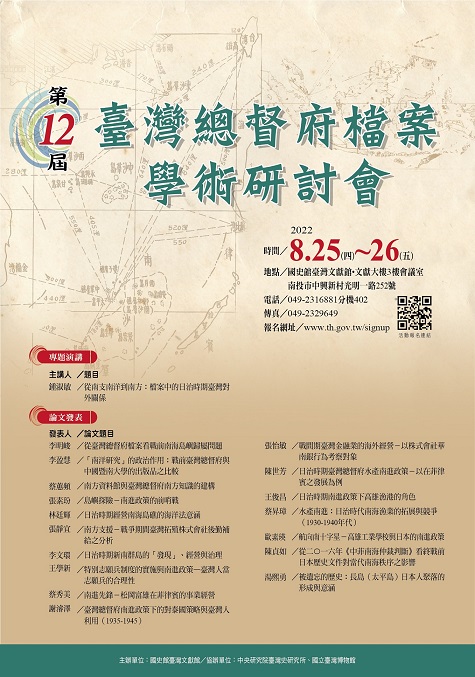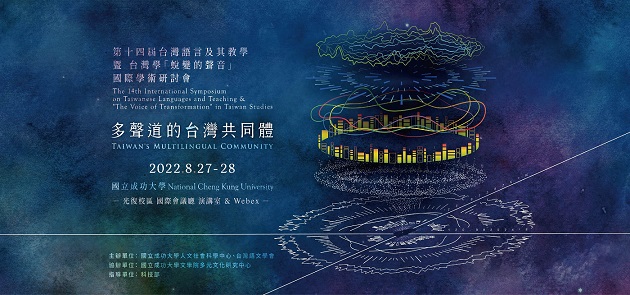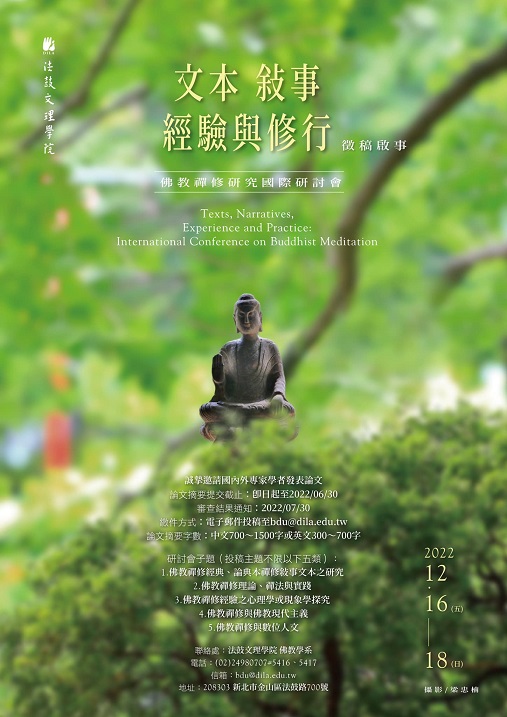第12屆臺灣總督府檔案學術研討會

標題:
時間:
2022年8月25至26日(週四至週五)
地點:
國史館臺灣文獻館文獻大樓3樓會議室(南投市中興新村光明一路254號)
主辦單位:
國史館臺灣文獻館
聯絡人:
石瑞彬,Tel: 049-2316881轉402
內容簡介:
一、 本研討會訂於111年8月25及26日(星期四、五),在本館文獻大樓3樓會議室舉行。發表論文計有國內專家學者17篇及專題演講1場。
二、歡迎對臺灣歷史及社會文化有興趣的各界人士踴躍報名參加,自7月21日起至8月10日止,以120名為限,如報名人數超過錄取名額,以抽籤方式決定。錄取名單於8月15日在本館網站公布,不再寄發錄取通知。
三、有意參加者可於本館報名系統線上報名
網址:https://www.th.gov.tw/signup
系統號:
C-020601
第14屆台灣語言及其教學暨台灣學「蛻變的聲音」國際學術研討會

標題:
第14屆台灣語言及其教學暨台灣學「蛻變的聲音」國際學術研討會
時間:
2022年8月27至28日(週六至週日)
地點:
成功大學光復校區國際會議廳演講室與線上會議並行(臺南市東區大學路1號)
主辦單位:
臺灣語文學會、國立成功大學人文社會科學中心
聯絡人:
顏先生,Tel: 06-2757575#56056;E-mail: nckutwchass@gmail.com
內容簡介:
本次會議由國立成功大學人文社會科學中心與台灣語文學會聯合主辦,會議的主題是「多聲道的台灣共同體」。聲音隱喻語言,不同的語言變體來自不同的族群、性別、年代、社會階層、邦界,每個話語主體皆具有自己的能動性,並在語言接觸中,不斷的變化。從聲音的社會寓意──所有聲音的獨特無可仿、聲音的穿透與聆聽、多聲的交雜和協商、聲響與話語的治理及主權爭奪等,探索台灣多元話語聲音的創造性與主體性。從結構語言學、社會語言學、語用學、認知語言學、教育心理學等各領域出發乃至於跨領域的方法,探究台灣各種語言多元存在的聲音。期能共創各種語言所代表的文化寓意之對話平台,共同思考並創造多語言共同體今後的永續共生。
❗報名截止日期8/17(三),報名實體參與者,未能於8/17(三)23:59前完成繳費,視同取消報名。
❗報名實體參與者,須於活動當日出示「完成COVID-19疫苗追加劑(第3劑)接種」證明,或「三日內快篩陰性」證明,使得進入會場,入場前請量額溫與酒精消毒,額溫≧37.5°C,禁止入場。入座後請勿更換座位,並於活動期間全程配戴口罩、保持社交距離。
❗報名線上參與者,本次線上視訊將使用「Cisco Webex」軟體,建議於活動前下載,與熟悉操作介面。
系統號:
C-020562
2022世界記憶國家名錄交流論壇

標題:
時間:
2022年9月2至3日(週五至週六)
地點:
文化部文化資產園區衡道堂小禮堂(臺中市南區復興路三段362號)
主辦單位:
文化部文化資產局
內容簡介:
一 紀錄遺產的類型與反思性歷史
郭揚義 國立自然科學博物館展示組研究助理、東海大學社會學系兼任助理教授
【與談】
謝國興 中央研究院臺灣史研究所研究員
翁佳音 中央研究院臺灣史研究所副研究員
二 世界記憶、地方史與文化資產
謝仕淵 國立成功大學歷史學系副教授
【與談】
張隆志 國立臺灣歷史博物館館長
黃貞燕 國立臺北藝術大學博物館研究所副教授兼所長
三 世界記憶與MLA 典藏機制
施登騰 中國科技大學室內設計系副教授
【與談】
陳淑美 國家發展委員會檔案管理局檔案徵集組組長
盧啟明 台灣基督長老教會歷史檔案館館長
四 世界記憶、文化史與全球化
蔣竹山 國立中央大學歷史學研究所副教授
【與談】
林正珍 國立中興大學歷史學系兼任教授
蘇碩斌 國立臺灣文學館館長
五 臺灣推動世界記憶計畫的回顧與展望
王嵩山 國立臺北藝術大學文化資產與藝術創新博士班暨博物館研究所合聘客座教授
【與談】
許雪姬 中央研究院臺灣史研究所研究員兼所長
鄭安睎 國立臺中教育大學區域與社會發展學系副教授
系統號:
C-020617
2022第十四屆發展研究年會「發展、韌性與復甦:後疫情與戰爭下的臺灣與區域研究」
標題:
2022第十四屆發展研究年會「發展、韌性與復甦:後疫情與戰爭下的臺灣與區域研究」
時間:
2022年11月18日至20日(週五至週日)
地點:
國立東華大學(花蓮縣壽豐鄉志學村大學路二段1-2號)
主辦單位:
台灣發展研究學會、國立東華大學臺灣文化學系
內容簡介:
2020年後,全世界面對疾病以及戰爭的威脅,短短幾年、甚至幾個月間,許多地區以及人民的日常生活面臨前所未有的挑戰、毀滅以及重構。在面臨這些挑戰時,人類社會如何在各層面抵禦、吸納、以及承受各類災難的影響,發展所謂的「韌性」(例如,韌性研究中最經典的韌性城市議題),並進一步從中尋找生路以求從災難中復甦,恢復各地方原本的日常生活以及關係,成為近年來人類社會面臨發展過程中重要的議題。
故,本屆年會主軸將環繞在此三個重要的關鍵字:發展 (Development)、韌性 (Resilience) 以及復甦 (Recovery),探討在COVID-19看似即將終止的時代,以及近期全球地緣政治衝突競合此一時空背景下,臺灣的經濟與在地知識與區域研究迸發出甚麼新的火花?臺灣社會又如何在眾多的挑戰中,從中找到新的道路持續行進?並且深入探討在新的區域以及全球時空背景下,臺灣與不同尺度的區域之間的關係又有甚麼新的變化與可能。
摘要錄取通知:7/15(五)前公布通過名單、摘要審查結果通知。
系統號:
C-020549
「形塑傳記:歷史性與日常性」國際學術研討會
標題:
時間:
2022年11月24至25日(週四至週五)
地點:
中研院近史所檔案館第一會議室+視訊(台北市南港區研究院路二段128號)
主辦單位:
中研院近史所
內容簡介:
論文全文繳交截止日:2022年10月31日(一)
會議說明:
傳記被認為是生動、較具人性的歷史書寫方式,不過正是這種濃厚的個人性,使傳記作品迥異於以政治、經濟、社會結構為中心的學院派歷史研究,甚至被貶抑於史學研究的邊緣位置。晚近歷史學及社會科學界出現「傳記轉向」,認為傳記承載了多層次的歷史經驗和變遷,能夠展示特定地點和環境的重要性,涉及個人生活的傳記作品正可成為理解社會和歷史變遷過程的一種視角。亦即,傳記一方面是可以用來解決更大的歷史問題的一種方式,利用個人作為「濾鏡」來審視歷史事件和進程;另一方面,傳記可以利用傳主的生活環境和社會情境,來討論「社會」如何在人們的生活過程中產生影響力。
有鑑於此,中央研究院近代史研究所擬在2022年11月24-25日(星期四、五)召開「形塑傳記:日常性與歷史性」國際學術研討會,並公開徵求稿件,討論傳記作為一種歷史書寫的再現與實踐/記憶與技藝。首先,我們歡迎針對各種傳記性質史料(如日記、自傳、傳記、回憶錄、口述歷史等)的介紹與反思,特別思考傳記材料的來源一開始是為何/如何被製作出來的?其次,傳記的主軸雖然是個人,但也可以是傳主生活的「地方」(place),「地方」在傳記中扮演何種角色?第三,傳記的性質正好處於社會史和文化史對話的中間地帶,究竟個人的能動性能否跳脫社會結構而展現?許多關於傳記的論辯都圍繞著代表性或獨特性的問題:一個小規模研究的主題能否代表了一個更大的整體,或者兩者有何差異?傳記的性質正好展演了個人與社會是如何交織在一起,兩者如何相互作用?第四,傳記的敘事模式。採用敘事方式的傳記,通常伴隨著個人經驗的自我反思,並且得以進一步探索種族、階級、性別、年齡等範疇在敘事中所扮演的角色。第五,傳記的歷史性與日常性正是討論歷史記憶的絕佳切入點,堪稱歷史女神Clio與其母記憶女神Mnemosyne聯手演出的劇碼。
系統號:
C-020548
2022書法美學與禪學國際學術研討會
標題:
時間:
2022年11月25至26日(週五至週六)
地點:
國立臺南大學文薈樓J106演講廳(台南市中西區樹林街二段33號)
主辦單位:
國立臺南大學人文學院
聯絡人:
邱小姐,Tel: 06-2133111-127
報導者:
國立臺南大學人文學院
內容簡介:
國立臺南大學「2022 書法美學與禪學國際學術研討會」
壹、緣起
臺南大學人文學院以發展「語文教育」與「在地文化」為核心主軸,積極推展「語文教育」、「書法藝術」、「在地文化推廣」、「文化行銷」、「文化觀光」與「文化資產學術研究」等議題,以「厚實學生人文素養」、「培育優秀小學師資」等為目標,並朝向「本土化」與「國際化」的邁進。本院國語文學系開設全臺唯一之「書法學程」,對於書法教育之投入,已行之有年,並設置「書法藝術教育跨領域學分學程」,供本校「教育學院」與「藝術學院」學生修習。書法研究與創作離不開美學的探究,而禪學為書法美學源頭之一。本次研討會以「書法美學與禪學國際學術研討會」為主題,期盼廣化深化書法美學、書法教育與禪學之對話與研究。
貳、會議目的
一、提倡書法研究與創作風氣。
二、推動書法與應用禪學的跨領域研究。
三、交流當代書法教育之理念與實務。
四、深究書法美學與禪學之內在連結。
參、會議子題
一、當代書法新潮之評介。
二、近期重要書法論著之評介。
三、書法教育理念與實務之分享。
四、當代書法與應用禪學思潮之發展。
五、書法美學與禪學關聯之探索。
專題演講人:
一、白謙慎(浙江文化大學教授)
二、楊儒賓 (國立清華大學哲學研究所講座教授)
陸、論文發表人:
(一)
發表人:宋灝(國立中山大學教授)
題 目:書法工夫、身體自我與禪
(二)
發表人:李秀華(東華大學中國文學系教授)
題 目:蘇軾尺牘與其生活禪思
(三)
發表人:張敏琪(巴黎高等社會科學研究院博士)
題 目:書法留白的間文化
(四)
發表人:谷川雅夫(日本奈良教育大學教授)
題 目:蘭溪道隆建長寺鐘銘書風的考察
(五)
發表人:李恭蔚(長榮大學教授)
題 目:日本江戶時代中期的書法和禪風:以佛教臨濟宗的白隱慧鶴禪師為例
(六)
發表人:林俊臣(國立臺南大學國語文學系助理教授)
題 目:現代書法創作的禪學資源
(七)
發表人:莊千慧(國立臺南大學國語文學系副教授)
題 目:從「雲花滿眼」到「乃造平淡」──論董其昌「以禪喻書」之書學觀
(八)
發表人:范俊銘(臺北護理健康大學兼任助理教授)
題 目:書法與禪學的意境—頓悟的美學探討
(九)
發表人:葉乙麟(國立暨南國際大學中國語文學系博士生)
題 目:評倪雅梅(Amy McNair)《中正之筆:顏真卿書法與宋代文人政治》
(十)
發表人:吳昭明(國立臺南大學國語文學系碩士班)
題 目:弘一法師晚年書法析論
系統號:
C-020646
2022經學與文化全國學術研討會
標題:
時間:
2022年12月2日(週五)
地點:
中興大學人文大樓1樓101演講廳(臺中市南區國光路250號)
主辦單位:
國立中興大學中國文學系
聯絡人:
曾小姐,Tel: (04)2284-0317#886;E-mail: lwtseng0328@dragon.nchu.edu.tw
內容簡介:
經典為不刊之鴻教,歷久彌新之常道,蘊含豐富之文化資產,亟需以現代科學文化知識,開發意蘊、闡揚微旨,以期返本開新。本屆「2022經學與文化全國學術研討會」意在探賾經學與文化的相關性與影響,期望以文會友,各獻所長,發揮學術與淑世之功能。
論文全文截稿日期:2022年9月30日
※附註:如來稿過多,無法安排在會中宣讀,則由本會柬擇,事非得已,敬請 曲宥。
系統號:
C-020546
文本、敘事、經驗與修行:佛教禪修研究國際研討會

標題:
時間:
2022年12月16日至18日(週五至週日)
地點:
法鼓文理學院(新北市金山區法鼓路700號)
主辦單位:
法鼓文理學院
內容簡介:
論文大綱提交已截止,審查結果於7月30日通知
研討會子題:
1 佛教禪修經典、論典本禪修敘事文本之研究
2 佛教禪修理論、禪法與實踐
3 佛教禪修經驗之心理學或現象學探究
4 佛教禪修與佛教現代主義
5 佛教禪修與數位人文
聯絡處:法鼓文理學院 佛教學系
電話 : (02)24980707#5416、5417
信箱:bdu@dila.edu.tw
地址:208303 新北市金山區法鼓路700號(收件人同聯絡處)
系統號:
C-020647
韌/任性:2023年文化研究年會暨研討會
標題:
時間:
2023年3月11-12日(週六至週日)
地點:
中興大學(台中市南區興大路145號)
主辦單位:
文化研究學會、國立中興大學台灣文學與跨國文化研究所
內容簡介:
2020年代遭遇全球疫情、戰爭危機、原物料短缺、與新科技環境的接連挑戰,一再考驗著個人、社群、國家、跨國流動的耐受力與彈性處置的應變策略。我們希望透過「韌/任性」這個大主題,來重新檢視這個「危機時代」當中,個體、文化、國族、社群面對大環境變化的適應力、自我改造、突破方式與創生能力。
2023年文化研究會議提出「韌/任性」的主題,希望邀集各界人士,就相關議題、事件、現象、觀點,提出文化研究視角的觀察、討論和研究分享。
我們規劃了不同的子題,邀請不同場域的觀察與探索共同對話,也歡迎各種符合年會主題,或文化研究領域議題的自組論壇提案。基於會議規模與經費等因素考量,本次會議不得已須限制每人發表論文篇數,以一篇為限。原則概述如下:
1⃣每位發表者為單一作者之論文發表,以一篇為限。
2⃣ 若與他人共組論壇,或第二作者合著身份,不在此限。
✴️ 子題題目
(一)原住民族的部落韌性
(二)韌性或任性的空間想像與實作
(三)全球媒介的韌性
(四)性/別研究:承襲與逆襲
(五)藝術創作實踐:科技創新與突變下的傳承與乖疑
(六)任性世代
(七)文化產業的韌性/任性
(八)人文理論的韌性
(九)音樂、身體與韌性
(十)Be Water,水能再聚
(十一)創生還是創傷?:地方創生的任性與韌性
(十二)粉絲的任性與堅持
(十三)語言的任/韌性實踐
(十四)文學的韌/任性與再生
✴️徵稿期程
?投稿截止期限:2022年8月20日
?審查結果通知:2022年9月
?論文全文截稿:2023年1月15日
系統號:
C-020582
2023華嚴專宗國際學術研討會

標題:
時間:
2023年4月27日至29日(週四至週六)
地點:
華嚴專宗學院講堂(臺北市濟南路二段44號4樓)
主辦單位:
華嚴專宗學院國際華嚴研究中心
聯絡人:
Tel: (02) 2356-0758
內容簡介:
華嚴專宗學院為表彰創辦人成一老和尚對華嚴弘傳之貢獻,每年舉辦學術研討會,廣邀專家學者發表論文,藉此提升華嚴學術研究水平,推廣華嚴教學,俾令現代學人瞭解華嚴的生活智慧,培養更多華嚴學者與行者。
(一) 華嚴與現代議題
(二) 華嚴經論研究
(三) 華嚴歷史與文獻
(四) 華嚴哲學思想
(五) 華嚴宗與諸宗派思想之比較
(六) 華嚴宗祖師行誼
(七) 華嚴藝術與文學
(八) 其他與華嚴學相關之主題
(一) 意者請於 2022 年10月31日前,將「投稿者資料表」WORD及PDF檔傳送至 huayenseminar@huayen.org.tw。
電子郵件主旨請註明「2023 研討會參加稿件─姓名」。若有完整文稿者,亦歡迎提供,以利審查。
(二) 預訂 2022 年 11 月中旬個別通知審查結果。
(三) 審查通過受邀者請於2023年2月10日前,將論文全文WORD檔及PDF檔傳送至 huayenseminar@huayen.org.tw。電子郵件主旨請註明
「2023 研討會全文稿件─姓名」。
(四) 研討會後,論文發表者請於2023年6月30日前,繳交修正後之論文WORD檔、PDF檔。
系統號:
C-020558
The 2nd Biennial Conference of the Society of Sinophone Studies
標題:
The 2nd Biennial Conference of the Society of Sinophone Studies
時間:
2023年5月12至14日
地點:
Penn State University
主辦單位:
The Society of Sinophone Studies
內容簡介:
The Sinophone world that is invigorated by “multisensory protests” and “ally-ship” (the focus of the 2021 conference) also constantly reinvents its pasts as it manufactures imaginaries of futurity through interactions with – sometimes in contradistinction to – other societies and communities and the world at large. As we adhere to the ethical investment and political sensitivity inherent to Sinophone studies as an intellectual formation, we must reflect upon how our conceptual and political categories, as well as our geographies, are pre-determined historically. The histories of empire and global geopolitics necessarily have left an imprint on existing social and cultural forms, legitimizing and making legible the connectivity between some of them while ostracizing and obscuring others. Likewise, human connections and relationality have been shaped by patterns of the flows of idea and movement of people across the globe even as we explore new pathways across the Sinophone spaces. How, then, does the Sinophone afford a useful lens for the critical scrutiny of historical crossroads, hence materializing the potential of renewal? How might we conceptualize spatial crossroads across a palimpsest of temporalities? How does the Sinophone offer an interdisciplinary platform to explore its conjunctions with empire studies, borderland studies, oceanic studies, indigeneity studies, race and ethnicity studies, gender studies, postcolonial and decolonial studies? How might the Sinophone shift the conventional focus on the continent, and through a reorientation to the seas, foster alternative imaginaries of the human world? This conference invites papers that situate contemporary Sinophone discussions in historical and interdisciplinary nexus of various forms. We are interested in papers that explore these themes, including—but not limited to—the questions:
How do the overlapping histories of empire and nation-state, both Chinese and non-Chinese, inform the contemporary geography and geopolitics of the Sinophone world? How do the movements of different populations, as settlers, colonialists, natives, or indigenous peoples engage with questions of power and territoriality? How do they conform to or challenge these imperial or inter-imperial geographies?
How do cultural infrastructures –language for one, but certainly beyond language – mediate the management of center and periphery, boundary and crossing? How does intermediality afford a lens to engage with intertwined environmental and geopolitical concerns beyond conventional conceptualizations of the nation and the region?
How do empires’ expansions foster historical formations of dissent, localism, trans-local and transnational alliances?
How do interdisciplinary forms of inquiry from literary and cultural studies, historical sociology or anthropology, linguistics, and other fields intersect in the studies of the Sinophone?
How does the Sinophone, an intellectual formation inspired by notions of the archipelagic and the relational, reconfigure landed or land-based understandings of power, culture, and history?
How does the Sinophone intersect with the “blue humanities,” and what critical potential arises from such a critical confluence?
How can the ocean figure as a source of epistemological innovation, to interrogate our own critical toolkit and vocabularies, and hence build new alliances for the Sinophone—such as with Indigenous Studies and Ethnic Studies?
How does the oceanic foreground the ecocritical impulses of the Sinophone?
The conference will be held in person at Penn State, University Park, on May 12-14, 2023, with a remote component to accommodate attendees who are unable to physically travel to the conference. Please submit an abstract (no more than 300 words) and short bio (no more than 100 words) via this Google Form by August 31, 2022. If you are unable to access the Google Form, please submit your abstract and bio by emailing admin@sinophonestudies.org
Members of the conference committee:
Shuang Shen (Penn State University)
Nicolai Volland (Penn State University)
Clara Iwasaki (University of Alberta)
Brian Bernards (University of Southern California)
系統號:
C-020595



